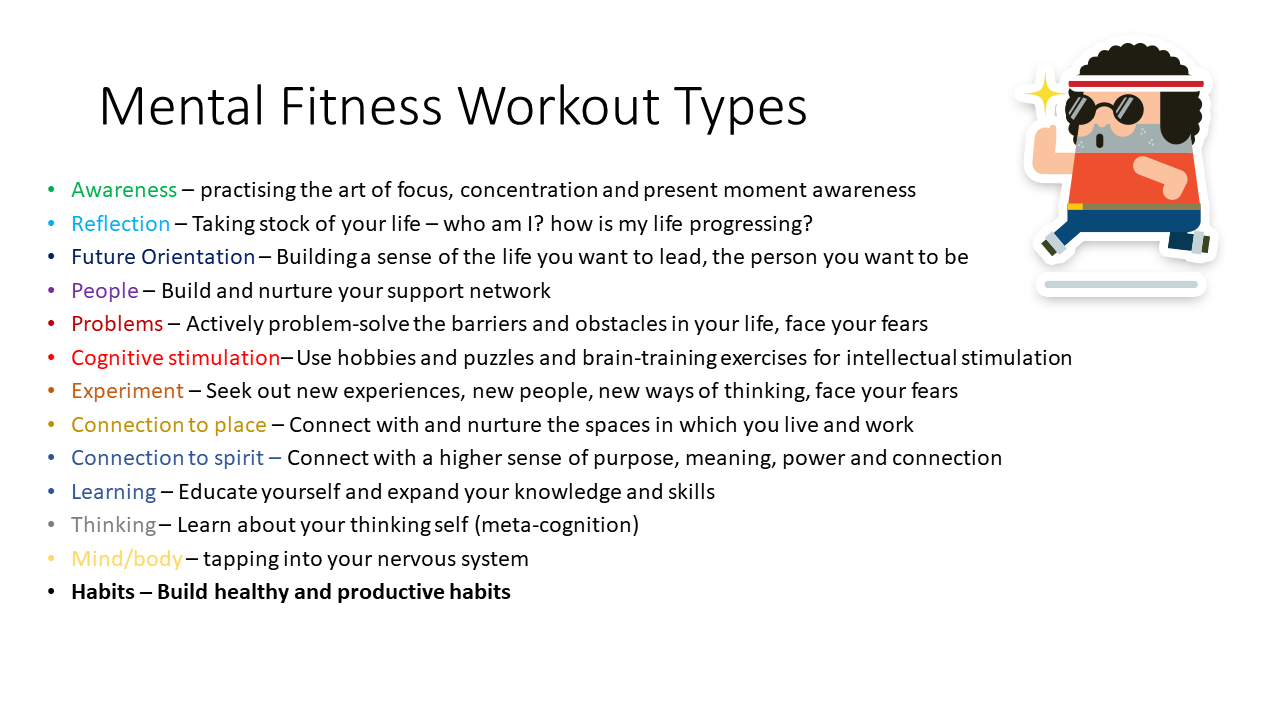
Mental Fitness has become a pet topic of mine.
I think about it and write about it a lot.
That thinking and writing culminated in the development of a 90-minute Mental Fitness Workshop that I lucky to be able to deliver students over the past couple of months. You can access the most recent version of the workshop slides here if you are interested.
The sessions were well attended and the feedback positive, which has left me feeling that Mental Fitness is a good vehicle for talking about self-improvement, productivity and self-development: topics that are of interest to many students (and staff like me as well).
Even though I have given a few workshops on the topic, every workshop has been different. I’ve tried multiple ways to describe the concept. Some have worked better than others.
At the core of the Mental Fitness model is the idea that we can train/exercise our minds.
In some workshops I have talked about mental fitness workouts. The goal is to add as many workouts as you can (within reason) such that you feel it is helping to strengthen your mental health over time. In this context, variety is good, as a singular focus on a single area can end up meaning you neglect other aspects of your experience.
Mental health is built over time, incrementally through the addition of these workouts to your life.
And these workouts aren’t necessarily complex. For example, the simple act of ‘goal-setting’ is a mental fitness workout focused on better defining the future you want for yourself. Sending a text message to a friend in which you thank them for being a cool person is a simple act of nurturing an important support in your life.

In other workshops, I have talked more about different archetypes or exemplars of training the mind. These are modelled on people I know, and observations I’ve made about how people train their minds (even if they don’t realise they are training their minds).
Exemplars include
- The Learner – dedicated to educating themselves and acquiring knowledge and skills
- The Meditator – delving into the experience of consciousness
- The Therapy Client – drawing on psychotherapeutic techniques to improve their emotional and behavioural health
- The Cognitive Stimulator – keeping their mind active and busy through hobbies and interests
- The Creative – exploring themselves and the world through creative and artistic expression
- The Mind-body Unifier – devoted to physical and mental health through training of the body
- The Habit Former or Self-Improver – fascinated with the change process and always seeking improvement in any domain
- The Self-Reflector – focused on understanding themselves as best as possible
- The Spiritual – seeking connection to a higher power or purpose
- The Adventurer – constantly trying new things and putting themselves outside of their comfort zone
- The Networker – building and nurturing new connections to bring ideas to reality
Now, despite my best efforts, in most of these workshops I didn’t get through the full workshop content (Sorry everyone!). There was just too much to say on the topic (I guess I have been thinking about the topic for a few years now).
So I started a Mental Fitness Community!
At the moment, the community isn’t anything more advanced than an email distribution list. If you join up to the list, you’ll get a fortnightly email from me in which I explore some aspect of the Mental Fitness model and explain how you can apply it in your everyday life. My goal is to give you practical and actionable advice on how to build mental fitness and mental health.
If this sounds like something you are interested in, all you need to do is register at https://confirmsubscription.com/h/r/3182BB1E1135C1132540EF23F30FEDED. It doesn’t matter if you haven’t read the workshop content. The emails I send will be accessible to anyone, regardless of their level of knowledge of the mental fitness model.
If the community takes off (we have 40+ people signed up already), I’ll look into improving the ‘community’ aspect by providing a digital space for community members to exchange ideas and goals.
So if self-development and self-improvement is an interest area of yours, get onboard. You aren’t the only one interested in that space 🙂
Can I join the community if I am not a student at Flinders?
Sure! Some of the references and stuff we talk about might not be relevant, but there will still be plenty of content that is relevant if you are interested. So welcome all!

